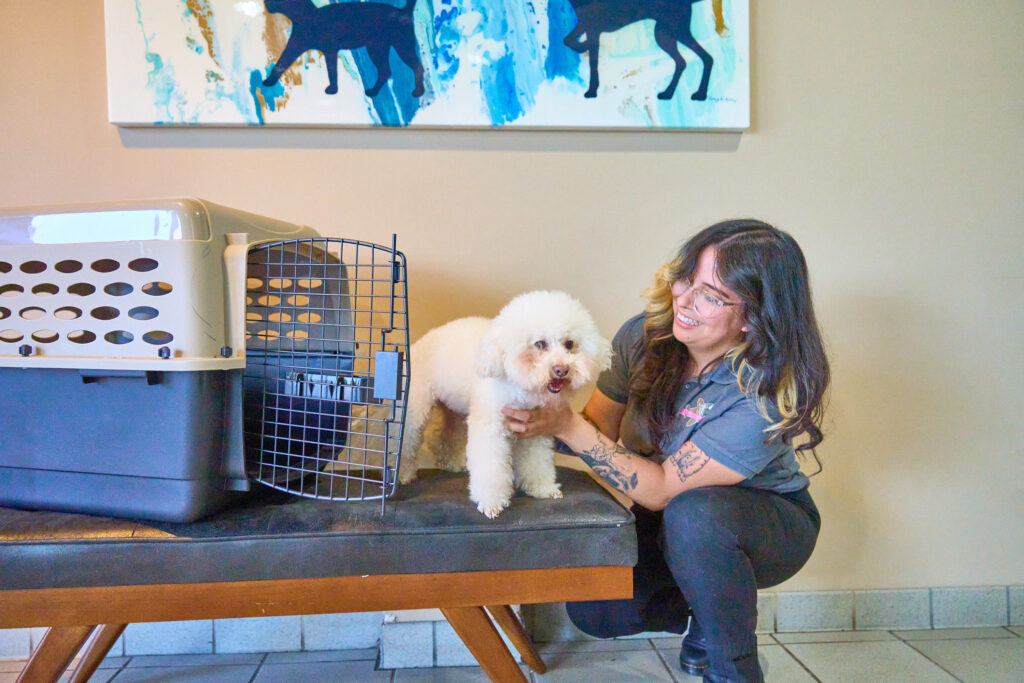
Bringing your pet to Costa Rica? We’ve handled numerous pet exports to Costa Rica — let us help with yours.
Bringing your pet to Costa Rica can be a smoother process than navigating countries with lengthy quarantines or strict testing protocols. That said, factors like your pet’s breed, size, and ideal travel time can influence which flights are available and how you prepare for the journey.
We’ll walk you through everything you need to know about pet travel to Costa Rica, including relevant paperwork, our preferred airlines, and when it makes sense to call in the experts.
Eligible Pets and Country Restrictions
Costa Rica does not have any active breed bans or restrictions, and it does not have any restrictions based on your origin point. However, the airline you choose for your pet’s flight may have breed restrictions in effect.
Eligible Pets
Costa Rica doesn’t have countrywide bans on specific breeds, but the airline you choose to fly there might. Volaris, a popular option for frequent routes to Juan Santamaría International Airport (SJO) in San José, restricts breeds of dogs considered dangerous or aggressive.
The following breeds aren’t allowed to travel either in-cabin or in cargo on Volaris:
- Akita
- American Bulldog
- American Staffordshire Terrier
- Anatolian Shepherd
- Boxer
- Bullmastiff
- Bull Terrier
- Cane Corso (Italian Mastiff)
- Doberman
- Dogo Argentino
- Dogue de Bordeaux
- English Bulldog
- Fila Brasileiro
- German Shepherd
- Neapolitan Mastiff
- Pit Bull
- Presa Canario
- Rottweiler
- Shar Pei
- Tosa (Japanese Mastiff)
Volaris doesn’t expressly ban brachycephalic or snub-nosed pets on their flights, but you’ll need to sign a liability waiver letter at check-in if you’re flying with one. That includes animals in-cabin and checked as cargo. The following dog breeds would require a waiver:
- Affenpinscher
- Boston Terrier
- Brussels Griffon
- Bulldog (all breeds)
- Chow Chow
- English Toy Spaniel
- Japanese Chin
- Lhasa Apso
- Maltese
- Pekingese
- Pug
- Shar Pei
- Shih Tzu
- Tibetan Spaniel
Snub-nosed breeds that overlap with the airline’s list of potentially dangerous breeds (e.g. Cane Corso, American Staffordshire Terrier, and boxer) are likely unable to fly on Volaris. As there may be exceptions, it’s always best to check with the airline before booking.
Snub-nosed cat breeds that would require a waiver include the following:
- Burmese
- Exotic Shorthair
- Himalayan
- Persian
We’re not done with their restrictions yet! Volaris also requires owners to sign waivers for small breeds of dog, like Chihuahuas, Yorkshire terriers, and Dachshunds, when planning Costa Rican travel. Again, be upfront about your pet’s breed when booking to avoid any obstacles at check-in.
Approved Countries
Costa Rica does not restrict pets based on country of origin. No matter where you’re starting your journey, import permit requirements are the same.
Planning an international flight for your pet? We can help.
Microchip and Vaccinations
Microchips are optional (but always highly recommended) for travel to Costa Rica. The country requires several different vaccines for traveling pets.
Microchip
Microchips aren’t officially required for pets traveling to Costa Rica, but it’s always best practice to have your pet microchipped.
We always recommend an ISO-compliant microchip that is easily readable by universal scanners, especially if they’re traveling outside of Costa Rica. It enhances pet identification and safety in emergency scenarios, and it makes your pet’s paperwork easier to verify. On most international health certificates, pets’ vaccination histories are linked to their microchip ID numbers.
Vaccinations
All cats and dogs over 3 months old must be vaccinated for rabies. Vaccines should be given at least 21 days before travel if it’s your pet’s first rabies shot. Any boosters should be current and documented on your pet’s health certificate.
There are no exceptions to this requirement, even if pets are coming from designated rabies-free countries. Rabies titer tests are not a suitable substitute for rabies vaccination.
Dogs traveling to Costa Rica should also be vaccinated for the following:
- Canine distemper
- Canine parainfluenza
- Infectious canine hepatitis
- Canine parvovirus
- Leptospirosis
The following vaccines are required for cats traveling to Panama:
- Feline viral rhinotracheitis
- Feline calicivirus
- Feline panleukopenia (enteritis)
This typically comes in the form of one shot, the FVRCP vaccine. Depending on your travel plans and your pet’s health history, your vet may have additional recommendations. Vaccination against Bordetella bronchiseptica is typically recommended for traveling dogs.

Blood Tests and Treatments
Costa Rica does not require a rabies titer for pet imports. All pets should be treated for internal and external parasites within 15 days of travel. Parasite treatments should be recorded on your pet’s health certificate to meet import requirements.
Import Documents
IPets flying as unaccompanied baggage, or cargo, will need an import permit ahead of travel through the Servicio Nacional de Salud Animal (SENASA). This is Costa Rica’s National Animal Health Service.
The form (DCA-PG-03-RE-01) is available for download from SENASA and can be returned via email or fax. Depending on the airline you choose for your trip, they may ask that you complete this step with a Costa Rican customs broker, just to ensure that you don’t miss anything. A professional pet shipper is another option for a more full-service experience.
All pets, whether they’re traveling in-cabin with you or in cargo, must travel with an international health certificate. This can be the Veterinary Health Certificate for the Export of Dogs and Cats from the United States of America to Costa Rica or an APHIS 7001 form. Both cover everything you need for your pet’s entry to Costa Rica.
Health certificates are filled out by a licensed veterinarian and then endorsed by “your country’s animal health authority,” per SENASA. In the U.S., that’s the U.S. Department of Agriculture (USDA). Endorsement by a USDA-accredited veterinarian is straightforward and can be done digitally through your vet’s office.

Health certificates should be issued within 14 days of travel. They include a section stating that your pet is free from contagious diseases and is in good health to travel, in addition to their rabies vaccination and treatment history.
Pets traveling in-cabin with their owner will need to present the health certificate at the border inspection checkpoint.
For pets arriving as cargo, health certificates should be available at the animal inspection area in the cargo terminal when the pet arrives. A final visual inspection of every pet happens before customs clearance and before pets are released to their owners.

Airline Information
There are several airlines that fly to Costa Rica, but our preferred option is Volaris. They have frequent flights to San José from major transportation hubs like Miami, Orlando, and Los Angeles. While they’re not all direct, many of their itineraries only involve quick refueling stops along the way that won’t add much travel time for you and your pet.
If you’re traveling with a larger dog on the list of prohibited breeds, you may need to choose an alternative airline. Alaska Airlines is a pet-friendly option that allows pets to fly in their baggage compartment if booked as excess baggage. This means that you’re flying with your pet rather than flying your pet as unaccompanied cargo.
Note: At Tailwind, we recommend that pets fly as cargo when possible, as that often means fewer connections and more efficient routes for pets. The shorter the flight, the better it is for your pet!
Alaska Airlines takes pets that are often defined as “dangerous” or more aggressive, unless they’re snub-nosed. Unfortunately, this restricts travel for most pit bull-type dogs, boxers, and mastiffs.
All airlines may restrict travel during the hottest months, whether that’s in the Northern or Southern Hemisphere, so it’s important to plan ahead. (If you’re browsing for pet-friendly flights and unable to find any to Costa Rica during a certain period of time, that may be why!)
If you’re traveling with a tricky breed or want to make sure you’re not planning a big move during an embargoed season, a professional pet shipping service can help.
Quarantine
Costa Rica does not have a quarantine requirement. Healthy, properly documented pets are released to you immediately upon arrival.
Returning to the U.S.
Costa Rica is not considered a high-risk country for rabies. For pets returning to the U.S. from Costa Rica without travel to any high-risk countries in the 6 months prior, refer to the CDC’s guidelines for pet imports from low-risk countries. As long as pets were vaccinated in the U.S., this generally only means filling out a CDC Dog Import Form.
How Tailwind Can Help
Traveling to Costa Rica with your pet can feel simple at first, but the details can quickly pile up, especially if you’re traveling with a pet that has unique needs. At Tailwind, we’ve guided pet owners through all kinds of challenges, handling everything from last-minute documentation to travel with snub-nosed dogs.
We’re here to take on the well-being of your pet from check-in to pick-up so that your travel experience is as stress-free as possible.

Ready to get started? Each pet relocation situation is different, so to get an idea of the costs involved, fill out a quote request.
See What Our Clients Have to Say

“We don’t have words to grateful all the effort and the amazing work you did during all this time to help us bring Luna from Costa Rica to Australia. We could not do it without your help and we don’t regret choosing your company, definitely was the best decision. Super grateful with Brady, he is an amazing and very professional person, he all time was super attentive and sending us updates about Luna. Thank you very much for all you team. We are recommending your company because we think you are the best to trust a process very delicate and demanding a lot of professionalism. The reason is clear, you cannot truest your family in inexpert hands and the price is worth it for all you did for her. Our little Luna is eating a lot she is super active and happy cat. Thanks for everything, and for all follow up during this time. Wishing you have a blessed 2023.”
– Bea R

“Brady, Michael, Dylan, and a very nice lady who works after normal working hours at Tailwind Global Pet (sorry, i forgot your name!) were absolutely amazing! They were prompt in their response times, spoke with clarity regarding all paperwork, and just went above and beyond to help me get my pup imported. From sending late night documents scans, and mediating with third party companies, they were simply incredible. Thank you, Tailwind Global Pet! You’ve made my experience a memorable one.”
– Shon W.

“I can’t say enough good things about Tailwind Global Pets! I reached out to them at the very last minute, feeling overwhelmed and unsure if things would come together for my pet’s travel. But the Tailwind team went above and beyond to support me.
Even when our paperwork fell apart right before the move, they stepped in and sorted everything out—calmly, quickly, and with such professionalism. Their boarding facility was excellent, and every single person I interacted with was kind, patient, and genuinely understanding.
Thanks to Tailwind, my pet is now safe and happy at home with me. I truly don’t know what I would have done without them. If you’re moving with a pet and want peace of mind, Tailwind is the team you want in your corner.”
– jayzee
